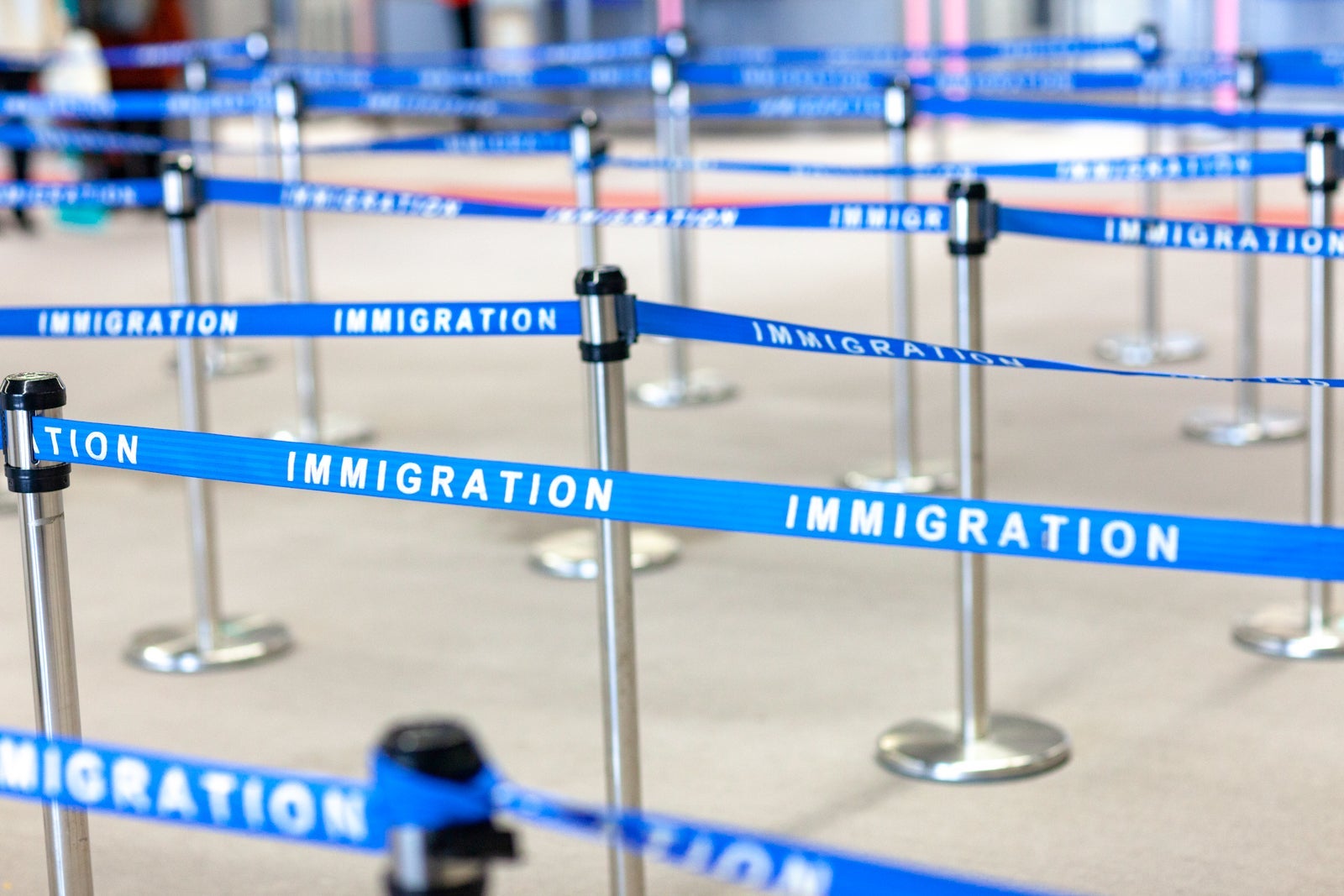How vacationing too long in Greece almost got me banned from Europe
Nobody ever looks for drama inside an airport terminal — unless you're Mel Brooks. But I found myself a starring role in a bit of immigration theatrics this summer thanks to the arcane world of the Schengen zone rules.
Let me set the stage: I was getting ready to depart from Athens International (ATH) and presented my passport for routine inspection. But instead of the perfunctory (and often indecipherable) stamp followed by "next!" the passport control officer thumbed through my passport book's many dog-eared pages before asking, "How long have you been in Greece?"
Related: The 12 mistakes tourists make in Greece
I was ready for it — or so I thought. I replied that I had been in the country since early April. U.S. citizens can stay in any European Union nation for up to 90 days without a visa. So, when I saw the three-month limit approaching earlier in the spring, I flew to nearby Cyprus and returned to Greece a few days later. I figured that should effectively reset my 90-day clock, and that I would not have stayed in the country for longer than three months at a time. No sweat, right?
Wrong.
Forget 5/24
"But you were also in Greece before April, yes?" He knew he was correct because he had my passport in his hands. But I couldn't quite see what he was driving at, especially not at 6 a.m. Perhaps sensing my confusion, he explained (and I am paraphrasing here) that while Americans can stay in Europe for up to 90 days, they can only do so once in a 180-day period. And the passport officer gauged that, because I had also been traveling around Greece for a good chunk of time prior to my quick trip to Cyprus in April, I had most likely overstayed my 90-day visa-free Schengen exemption.

He didn't issue a fine, but he explained something about the rules adding, "Just be careful about when you intend to come back."
Such was my introduction to the prosaic but also incredibly pesky world of the so-called 90/180 rule. And forget about 5/24: Unlike the Chase rule on credit cards, this one could get you banned from Europe. I had only grasped the first half — but start talking to your fellow road warriors or Googling things like "overstay in Europe" and it turns out the tentacles of the Schengen zone are really a thing, and many U.S. travelers have stories about being tangled up in them unawares.
My own private Athens airport earthquake had aftershocks, because once I finished my trip to the U.K. I realized even though I had a perfectly valid return ticket to Athens in July, I would have to cancel my flight. Yes, I could fly back to Athens, or Rome, Paris or Berlin for that matter, but if an assiduous customs officer in any of those cities paid attention to my passport stamps indicating I had previously overstayed in the Schengen zone, they could legitimately deny me entry, and I would have to buy a brand new ticket on the spot and leave. And watching two months of travel plans unravel was, to say the least, not pretty. For starters, I would have to buy a new ticket if I wanted to return to the Schengen zone, and not before September. Ouch.

What is the Schengen Area?
Prior to the creation of the Schengen zone in 1995 (based on a treaty signed years earlier in Schengen, Luxembourg), travelers would have to show ID to go from, say, France to Italy, or from Germany to Denmark. (For citizens of European Union countries, no passport was needed, merely a national ID.)
But that's no longer the case. Within the Schengen area, internal border checks are now mostly a thing of the past. It's when initially entering the Schengen zone from a non-Schengen nation that things get tricky: As the State Department reminds travelers, "with a valid U.S. passport, you can stay up to 90 days for tourism or business during any 180-day period."

And they repeat in bold, "Do not overstay! You must wait an additional 90 days before applying to re-enter the Schengen area."
Also, don't confuse the Schengen zone with the European Union itself, or the E.U. Customs Union for that matter. Schengen is an area of 26 European states that have done away with passport checks along their mutual borders, and the zone comprises a single jurisdiction, with a standardized visa policy, for the purposes of international travel. Some countries such as Switzerland do not belong to the E.U. but are part of the Schengen area, while others like Cyprus are not part of the Schengen area but are members of the E.U.
American citizens have automatic visa exemptions for entry into the Schengen area for stays of up to 90 days in any 180 day period, so if you think your three-month sojourn in Tuscany might turn into three and a half, remember that you do need a visa—or will need to leave at the end of 90 days. Prior to 1995, Americans in Europe who approached the 90-day mark in European Country A would simply fly or (more likely) take the train to the country next door, get their passport stamped in European Country B and return to European Country A for another stay of up to 90 days. But that no longer works. The flip side of Schengen rules making things more relaxed for intra-European travel is that now U.S. citizens cannot simply slip across the border and come back; for one, no one's going to stamp your passport between France and Belgium or Hungary and Austria anymore.
Neither the European Union nor the U.S. does a very good job of explaining the mechanics of the 90/180 rule, and airlines are only going to check to see if your passport is valid: It's your responsibility to familiarize yourself with the restrictions.
Suppose you fly to Italy on Jan. 1 and stay for 90 days. You don't need a visa, so you'll have to leave Italy by April 1 — but you want to spend Easter in Rome, so you fly to New York City on April 1 and get a ticket to come back to Rome on April 12. Well, you can buy the ticket but you can't use it, because if you show your passport at the airport in Rome and a customs officer sees that you previously entered Italy on Jan. 1 and stayed until April 1, he or she will see that — in the six months leading up to April 12 — you already stayed 90 days. And even flying to a country that not's functionally part of Schengen yet (like Cyprus) for a few days won't change that. In this scenario, the soonest you can come back to Italy, by the letter of the law, is July 1. That's because in the 180 days prior to July 1, you won't have stayed longer than 90 days. Still confused? Check out this handy tool.
Repercussions for violating 90/180
What happens, though, if you disregard (or didn't read this article and just didn't know about) the rules and flew to Rome on, say, May 1? Again, the airline will be more than happy to sell you a ticket. But if customs officials in Rome see that letting you clear passport control would place you in violation of the 90/180 rule, yes, they can deny you entry to the country. In which case, you could be forced to buy a ticket, likely at full price, to return to the U.S. or another country outside the Schengen area on the spot.
But it's probably not as problematic as being caught overstaying your 90-limit while still in, or upon leaving, a country in the Schengen zone. If it's just a couple of days and you honestly lost track of time (heck, isn't that why you went to Europe in the first place?), chances are customs officials will be lenient. But if you obviously overstayed by a longer stretch of time without a valid reason or sans the requisite visa, you could face hefty fines — which vary by country but could easily exceed 1,200 euros (or $1,300). Getting flagged as an overstayer could even bar you from future visits.

How about just using a second passport, if you have one? In theory that could work, but in practice I know of no country or attorney that would advise using a second passport to try to outmaneuver the Schengen rules.
Of course, customs officials often barely glance at your passport, or not even bother to stamp it. But assume that your stamps will be read and that questions could be asked. After all, it's not a border control officer's job to simply wish you a bon voyage. And in the age of low-cost, long-haul air travel and Airbnb, which can make extended stays overseas more budget-friendly than ever before, losing track of the calendar while galavanting abroad is not far-fetched. But it's up to you, not the State Department or anyone else, to do the math.
Related: The best starter credit cards to use with low-cost carriers
It also bears mentioning that, starting next year, biometrics will likely be introduced in the Schengen area as well as a new entry and exit system that will record refusals of entry and ultimately replace the manual stamping of passports. So, even if you're disinclined to crunch the numbers and can't easily keep track of how many days you've stayed in the zone, the computers will very soon start doing that for you. That will make the process of visiting Europe more efficient, but as for those days of endless worry-free wanders around the continent? Arrivederci!
You may not be keeping track of when your accumulated 90 days are up, but rest assured that before too long someone else will be.
TPG featured card
at Capital One's secure site
Terms & restrictions apply. See rates & fees.
| 5X miles | Earn 5X miles on hotels, vacation rentals and rental cars booked through Capital One Travel |
| 2X miles | Earn unlimited 2X miles on every purchase, every day |
Pros
- Stellar welcome offer of 75,000 miles after spending $4,000 on purchases in the first three months from account opening. Plus, a $250 Capital One Travel credit to use in your first cardholder year upon account opening.
- You'll earn 2 miles per dollar on every purchase, which means you won't have to worry about memorizing bonus categories
- Rewards are versatile and can be redeemed for a statement credit or transferred to Capital One’s transfer partners
Cons
- Highest bonus-earning categories only on travel booked via Capital One Travel
- LIMITED-TIME OFFER: Enjoy $250 to use on Capital One Travel in your first cardholder year, plus earn 75,000 bonus miles once you spend $4,000 on purchases within the first 3 months from account opening - that’s equal to $1,000 in travel
- Earn unlimited 2X miles on every purchase, every day
- Earn 5X miles on hotels, vacation rentals and rental cars booked through Capital One Travel
- Miles won't expire for the life of the account and there's no limit to how many you can earn
- Receive up to a $120 credit for Global Entry or TSA PreCheck®
- Use your miles to get reimbursed for any travel purchase—or redeem by booking a trip through Capital One Travel
- Enjoy a $50 experience credit and other premium benefits with every hotel and vacation rental booked from the Lifestyle Collection
- Transfer your miles to your choice of 15+ travel loyalty programs
- Top rated mobile app


